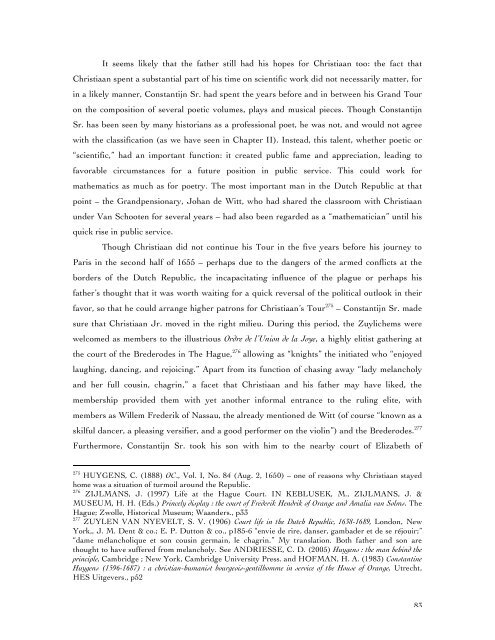Christiaan Huygens – A family affair - Proeven van Vroeger
Christiaan Huygens – A family affair - Proeven van Vroeger
Christiaan Huygens – A family affair - Proeven van Vroeger
You also want an ePaper? Increase the reach of your titles
YUMPU automatically turns print PDFs into web optimized ePapers that Google loves.
It seems likely that the father still had his hopes for <strong>Christiaan</strong> too: the fact that<br />
<strong>Christiaan</strong> spent a substantial part of his time on scientific work did not necessarily matter, for<br />
in a likely manner, Constantijn Sr. had spent the years before and in between his Grand Tour<br />
on the composition of several poetic volumes, plays and musical pieces. Though Constantijn<br />
Sr. has been seen by many historians as a professional poet, he was not, and would not agree<br />
with the classification (as we have seen in Chapter II). Instead, this talent, whether poetic or<br />
“scientific,” had an important function: it created public fame and appreciation, leading to<br />
favorable circumstances for a future position in public service. This could work for<br />
mathematics as much as for poetry. The most important man in the Dutch Republic at that<br />
point <strong>–</strong> the Grandpensionary, Johan de Witt, who had shared the classroom with <strong>Christiaan</strong><br />
under Van Schooten for several years <strong>–</strong> had also been regarded as a “mathematician” until his<br />
quick rise in public service.<br />
Though <strong>Christiaan</strong> did not continue his Tour in the five years before his journey to<br />
Paris in the second half of 1655 <strong>–</strong> perhaps due to the dangers of the armed conflicts at the<br />
borders of the Dutch Republic, the incapacitating influence of the plague or perhaps his<br />
father’s thought that it was worth waiting for a quick reversal of the political outlook in their<br />
favor, so that he could arrange higher patrons for <strong>Christiaan</strong>’s Tour 275 <strong>–</strong> Constantijn Sr. made<br />
sure that <strong>Christiaan</strong> Jr. moved in the right milieu. During this period, the Zuylichems were<br />
welcomed as members to the illustrious Ordre de l’Union de la Joye, a highly elitist gathering at<br />
the court of the Brederodes in The Hague, 276 allowing as “knights” the initiated who “enjoyed<br />
laughing, dancing, and rejoicing.” Apart from its function of chasing away “lady melancholy<br />
and her full cousin, chagrin,” a facet that <strong>Christiaan</strong> and his father may have liked, the<br />
membership provided them with yet another informal entrance to the ruling elite, with<br />
members as Willem Frederik of Nassau, the already mentioned de Witt (of course “known as a<br />
skilful dancer, a pleasing versifier, and a good performer on the violin”) and the Brederodes. 277<br />
Furthermore, Constantijn Sr. took his son with him to the nearby court of Elizabeth of<br />
275 HUYGENS, C. (1888) OC., Vol. I, No. 84 (Aug. 2, 1650) <strong>–</strong> one of reasons why <strong>Christiaan</strong> stayed<br />
home was a situation of turmoil around the Republic.<br />
276 ZIJLMANS, J. (1997) Life at the Hague Court. IN KEBLUSEK, M., ZIJLMANS, J. &<br />
MUSEUM, H. H. (Eds.) Princely display : the court of Frederik Hendrik of Orange and Amalia <strong>van</strong> Solms. The<br />
Hague; Zwolle, Historical Museum; Waanders., p33<br />
277 ZUYLEN VAN NYEVELT, S. V. (1906) Court life in the Dutch Republic, 1638-1689, London, New<br />
York,, J. M. Dent & co.; E. P. Dutton & co., p185-6 “envie de rire, danser, gambader et de se réjouir;”<br />
“dame mélancholique et son cousin germain, le chagrin.” My translation. Both father and son are<br />
thought to have suffered from melancholy. See ANDRIESSE, C. D. (2005) <strong>Huygens</strong> : the man behind the<br />
principle, Cambridge ; New York, Cambridge University Press. and HOFMAN, H. A. (1983) Constantine<br />
<strong>Huygens</strong> (1596-1687) : a christian-humanist bourgeois-gentilhomme in service of the House of Orange, Utrecht,<br />
HES Uitgevers., p52<br />
83


